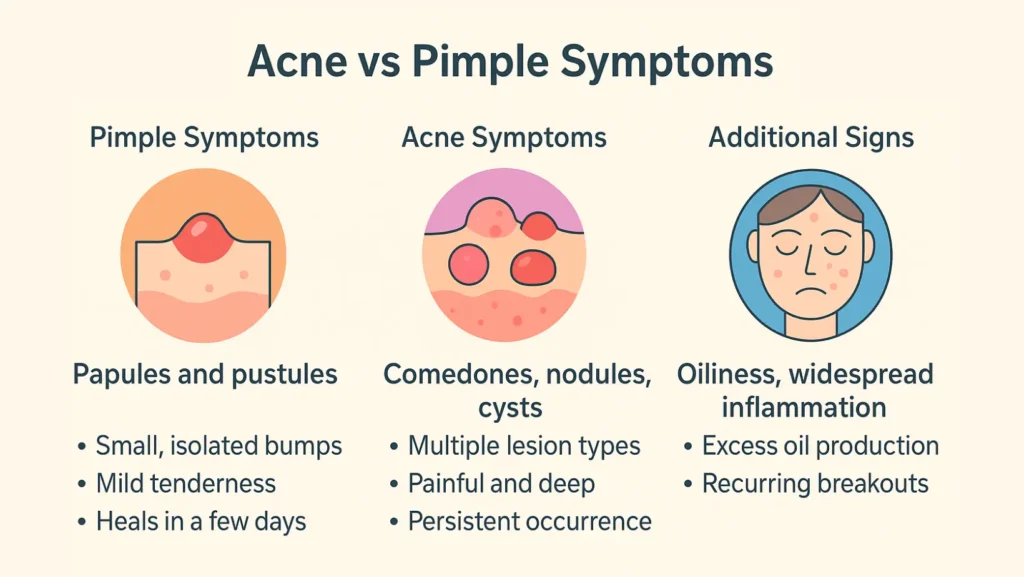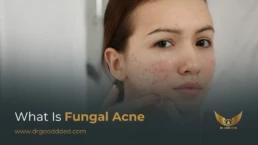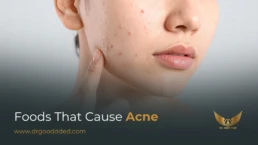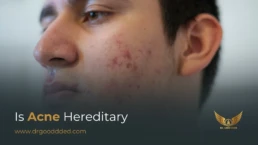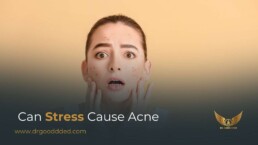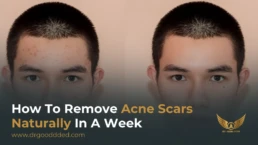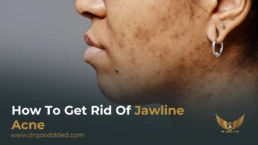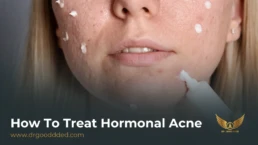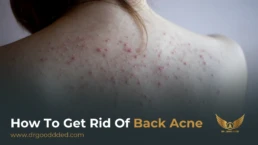The difference between acne and pimples is based on how many spots you have, how long they last, and how deeply the skin gets inflamed.
Table of Contents
ToggleA pimple is a single blocked pore that turns into a red bump or a pus-filled bump. Acne is a long-lasting skin condition that includes blackheads, whiteheads, papules, pustules, nodules, and cysts.
Pimples heal fast and usually stay on the surface. Acne forms when your pores keep clogging, oil builds up, and inflammation spreads across larger areas such as the face, chest, or back.
Acne lasts longer, flares in cycles, and can cause scars when not treated early. Pimples are short problems. Acne is an ongoing condition that needs steady care and sometimes medical treatment.
Acne Vs Pimple Symptoms:
Pimple Symptoms: Papules And Pustules
A pimple is a small, local bump on the skin. It can be a red bump called a papule. It can be a pus-filled bump called a pustule. Pimples often hurt a little. They usually appear alone or in small groups. You see them on the face, back, or chest. A pimple heals in days to a week with care.
Acne Symptoms: Comedones, Nodules, Cysts & Chronic Flare Patterns
Acne shows many types of spots at once. You may see comedones. Comedones are blackheads and whiteheads. You may see nodules. Nodules are large, hard lumps under the skin. You may see cysts.
Cysts are deep, painful, fluid-filled lumps. Acne often flares in cycles. The skin can stay oily and inflamed for months. This pattern is the real difference between acne and pimples.
Additional Signs: Oiliness, Widespread Inflammation
Acne usually means oily skin and many spots. Oil comes from overactive oil glands. The skin looks shiny. Many pores clog at once. The area may be red and tender. A lone pimple does not mean oily skin. Widespread oil and repeated spots point to acne.
Types Of Acne Vs Pimples
Blackheads And Whiteheads (Comedones)
Blackheads are open comedones. The pore stays open and the top darkens. Whiteheads are closed comedones. The pore stays closed, and a tiny white bump forms. Both are mild forms of acne. They do not always hurt. They show pore clogging.
Papules & Pustules (Inflamed Pimples)
Papules are small red bumps without pus. Pustules are small bumps that have pus. These are what most people call pimples. They are inflamed and tender. A few pustules do not equal acne. Many inflamed bumps across the face are acne.
Nodules & Cysts (Severe Acne Types)
Nodules are deep, hard, painful lumps. Cysts are soft, fluid-filled, painful lumps. Both can leave scars. These severe types require medical care. They are a clear sign of acne that needs more than spot treatment.
Skin Issues Mistaken For Pimples (Folliculitis, Milia)
Not every bump is a pimple. Folliculitis is an infected hair follicle. Milia are tiny white cysts that do not open. Heat rash and allergic bumps can look similar. A doctor can tell the difference if you are unsure.
Acne Vs Pimples Causes: Key Differences
Root Causes: Oil, Clogged Pores, Bacteria, Inflammation
Both start with a clogged pore. Oil mixes with dead skin cells and blocks the pore. Bacteria multiply in that plug. The body sends inflammation to fight the bacteria. A single blocked pore becomes a pimple. Many blocked pores with constant oil and inflammation become acne. This is the core difference between acne and pimples.
Hormonal Triggers And Puberty
Hormones control oil production. In puberty, androgen hormones rise. This makes more oil. Many teens get acne. Women can have acne during their menstrual cycles. Pregnancy and some medications change hormones, too. Hormones are a main cause of acne.
External Triggers: Makeup, Friction, Sweat, Products
Heavy makeup can clog pores. Thick creams and certain oils can trap oil. Friction from helmets or tight collars can cause bumps. Sweat mixed with oil can worsen spots. These external factors are common causes of pimples and acne flares.
Diet, Stress, Sleep & Scientific Evidence
Diet affects acne for some people. Foods high in sugar can make acne worse for some. Dairy may influence acne in some people. Stress raises hormones that can trigger flares. Poor sleep harms skin repair. These factors do not always cause acne alone. They can raise the chance of flare-ups.
When Pimples Suggest A Non-Acne Condition
If a bump grows fast and becomes very painful, see a doctor. If you have fever or spreading redness, you may have an infection. Recurrent bumps in the same spot can mean a cyst. This helps you know when a pimple is not simple.
Acne Vs Pimples Treatment Differences
Spot Treatments For Single Pimples
A single pimple often heals with spot care. Use benzoyl peroxide gel on the spot once nightly. Use salicylic acid for clogged pores. A warm compress helps a pustule drain naturally. Do not pick or squeeze the pimple. Picking causes scarring and spreads bacteria. These steps treat a pimple without full acne therapy.
Best Treatments For Mild To Moderate Acne
Mild to moderate acne needs a routine plan. Cleanse your face twice daily with a gentle cleanser. Use a topical retinoid at night. Use benzoyl peroxide or topical antibiotics in the morning. Combining a retinoid and benzoyl peroxide works well. These medicines reduce oil, unclog pores, and kill bacteria. You must keep using the treatment for at least eight to twelve weeks to see clear results.
When To Use Oral Antibiotics Or Hormonal Therapy
If acne spreads and becomes worse, a doctor may give oral antibiotics. These lower bacteria reduce inflammation. Use antibiotics for limited periods to avoid resistance. For women with hormonal acne, oral contraceptives can help. Spironolactone lowers male hormone effects and can improve acne in women.
When Isotretinoin Is Needed
When acne is severe, you may need isotretinoin. Isotretinoin is a strong medicine that cuts oil production. Doctors use it for nodules, cysts, or scarring. You must follow safety steps. Women who can become pregnant need strict birth control. Your doctor will check blood tests before and during treatment. Isotretinoin can clear acne that did not respond to other care. Always work with a doctor when you take it.
Dermatologist Procedures: Peels, Steroid Shots, Extractions
A dermatologist can speed healing and lower scar risk. They may give a steroid shot into a nodule. That reduces pain and size in days. They can extract blackheads and whiteheads safely. Chemical peels remove the top layer of skin to improve texture. Laser and light treatments can lower oil and reduce scars. These steps help when home care fails.
Are Acne And Pimples The Same
You might still ask if acne and pimples are the same. They are not the same. A pimple is one spot. Acne is a skin disease that causes many spots. Knowing this difference between acne and pimples helps you choose the right care. If you treat a single pimple well, you may avoid bigger problems. If you have many spots, you need a steady plan.
Warning Signs: Painful Nodules, Fast-Growing Lumps
Watch for fast-growing painful lumps. See a doctor if a lump grows quickly. See care for spreading redness or fever. These signs may mean infection or deep cysts. Quick help can stop tissue damage and scarring.
Scarring Risk & Long-Term Skin Changes
Deep inflammation can damage the skin framework. That causes pits or raised scars. Dark marks called post-inflammatory hyperpigmentation can remain after healing. Early proper care lowers lasting damage. Treating acne early gives your skin a better chance to heal cleanly.
What Dermatologists Look For During Evaluation
A dermatologist looks at the types of lesions. They check for comedones, papules, pustules, nodules, and cysts. They ask when spots started and how they changed. They ask about medicines and family history. They may test hormones if acne is severe or sudden. This helps your doctor choose the best plan.
Prevention: How To Reduce Pimples And Acne Flares
Best Daily Skincare Routine
You can lower flares with a simple routine. Clean your face twice a day with a mild cleanser. Use lukewarm water. Pat your skin dry. Apply a non-comedogenic (won’t block pores) moisturizer. Use sunscreen every morning.
At night, use a retinoid if your skin tolerates it. Keep your hair clean and off your face. These steps help how to reduce pimples and acne flares.
Makeup/Haircare Mistakes That Worsen Breakouts
Avoid heavy or oily makeup. Remove all makeup before bed. Choose products labeled non-comedogenic. Avoid oily hair products near your forehead. Clean makeup brushes often. If you wear a helmet or tight gear, clean it regularly to cut friction and oil build-up.
Lifestyle Habits That Help
Sleep well. Manage stress with short walks or simple breathing. Eat more whole foods and fewer high-sugar snacks. Stay hydrated. Stop smoking. These steps support skin healing and reduce triggers. Small habits add up.
What To Avoid (Picking, Scrubs, Harsh Cleansers)
Do not pick or pop pimples. Picking spreads bacteria and causes scarring. Avoid rough cloths and grainy scrubs. They irritate the skin. Skip strong alcohol-based cleansers. They dry your skin and cause more oil later. Use gentle products instead.
Long-Term Effects: Scarring, Pigmentation & Emotional Impact
Types Of Acne Scars
Scars vary by depth and shape. Atrophic scars are shallow pits. Hypertrophic scars are raised. Rolling scars make the skin look uneven. A dermatologist can recommend treatments based on scar type. Options include lasers, fillers, microneedling, and surgery.
Post-Inflammatory Hyperpigmentation
Dark spots can follow healed acne. These spots are not scars. They are pigment changes. Sun exposure makes them darker. Use sunscreen and gentle brightening treatments to help them fade.
Psychological Impact & Confidence Issues
Acne can affect how you feel about yourself. You may feel shame, anxiety, or low confidence. Talk to a trusted person or a professional if acne affects your mood. Treating acne often improves how you feel. Mental health care matters as much as skin care.
FAQs
Can a pimple turn into acne?
A single pimple does not become acne by itself. Repeated blocked pores and ongoing oil production can lead to acne. Proper care prevents worsening and spread.
How long does a pimple take to heal?
A simple papule or pustule heals in about three to seven days. Deeper nodules and cysts take weeks. Scars can last much longer without treatment.
Should you pop pimples?
Do not pop pimples. Popping increases inflammation and spreads bacteria. It raises the chance of scarring and dark marks. Use spot treatments and let a professional extract if needed.
Are blackheads considered pimples?
Blackheads are open comedones and count as a form of acne. They differ from inflamed pimples. Blackheads form from clogged pores and need unclogging, not popping.
Does diet cause pimples or acne?
Diet alone rarely causes acne for everyone. High-sugar foods and some dairy may worsen acne for some people. Balanced meals and low sugar can help reduce flares.
How long do acne treatments take to work?
Topical treatments need eight to twelve weeks to show real change. Oral medicines may take weeks. Isotretinoin needs months but can give lasting results when used correctly.
Is fungal acne real and is it acne?
Fungal acne is a type of folliculitis caused by yeast. It looks like small bumps and needs antifungal treatment. It is not true bacterial acne and requires different care.
When are antibiotics appropriate?
Antibiotics help when acne is widespread and inflamed. They reduce bacteria and inflammation short term. Use combined therapy and limit duration to prevent resistance. Doctor guidance is essential.
Can acne be prevented completely?
You cannot always prevent acne completely. You can lower risk with good care, early treatment, and healthy habits. Genetics and hormones still play a major role in many cases.
Are OTC retinoids enough for acne?
OTC retinoids help with mild acne and maintenance. Moderate to severe acne often needs prescription retinoids or combined therapy. Your doctor can advise the best option for your skin.
When should I see a dermatologist?
See a dermatologist for nodules, cysts, scarring, or acne that does not improve after three months of good care. Seek help if acne affects your mood or life.
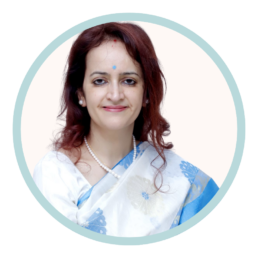
This article is medically reviewed by Dr. Nivedita Pandey, Senior Gastroenterologist and Hepatologist, ensuring accurate and reliable health information.
Dr. Nivedita Pandey is a U.S.-trained gastroenterologist specializing in pre and post-liver transplant care, as well as managing chronic gastrointestinal disorders. Known for her compassionate and patient-centered approach, Dr. Pandey is dedicated to delivering the highest quality of care to each patient.

